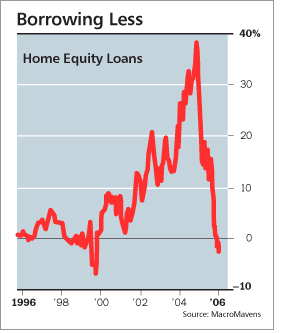
The Big Picture lays out a good analysis of how [consumer spending correlates with housing prices](http://bigpicture.typepad.com/comments/2006/01/consumer_spendi.html)
>Historically, consumer credit has roughly tracked
>overall changes in house prices. In other words,
>the consumers’ ability to borrow — and then go out
>and spend — has been highly correlated to real
>estate changes (and hence, the importance of
>interest rates).
>In a stimulus-driven environment like we’ve enjoyed
>for the past three years, instead of real wage growth,
>there’s been a lot of consumer borrowing propelling
>their spending. I expect as the borrowing slows down,
>so too will the consumer spending.
In [Barron’s Up and Down Wall Street Column, Alan Abelson writes:](http://online.barrons.com/article_search/SB113780094391852533.html?mod=search&KEYWORDS=alan+abelson&COLLECTION=barrons/archive)
>the trouble with fantasies is that no matter how pleasurable
> while they last, they leave a distinctly bitter aftertaste when
>they go “poof.” And last week they went “poof.” The economy
>obviously has been slowing, as will be evident when we get the
> first reading on GDP. Inflation may take an occasional breather,
> but it’s very much alive and malign. And is there any sentient —
>or should we say sober — soul who can’t hear the air finally
>oozing out of the housing bubble?

The chart shows that home-equity loans, which have been a catalyst for consumer spending, have fallen sharply.
“MacroMavens’ proprietor, Stephanie Pomboy, puts it, of the “marginal consumption buck” — are going south for the first time since the last recession in 2000.
The downturn in home-equity loans, she further notes, is part and parcel of the recent overall sharp retreat in consumer borrowing, which has suffered its first quarterly contraction since the recession of 1991. And credit, she notes, “has come to replace wages as the driver of consumption. Last year, the $375 billion gain in disposable income fell way short of the $500 billion increase in consumption.”
We have also [tracked GDP [Miller Samuel]](https://millersamuel.com/charts/gallery-view.php?ViewNode=1127916015IRgyc&Record=12) against local Manhattan indicators and found there to be [a general correlation between the national GDP statistics and local housing prices. [Curbed]](http://www.curbed.com/archives/2005/09/28/three_cents_worth_gdp_as_a_pdg_real_estate_indicator.php).
The Conclusion?
The Fed’s “measured growth” policy of raising short term rates have hit critical mass in the home-equity market as most of this type of lending is based on adjustable rate financing instruments. Since consumer spending comprises 2/3 of the economy and consumer spending has been driven by borrowing through home-equity loans rather than wage increases, it seems plausible that they will stop raising rates fairly soon or housing and the economy will slip more than planned.

